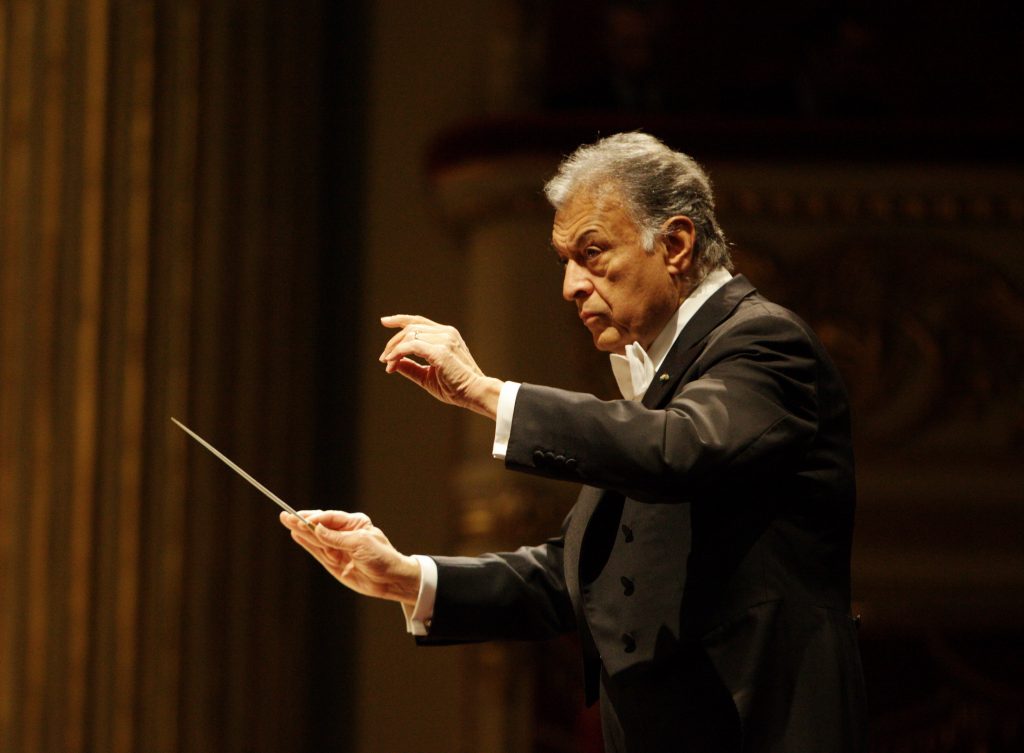
By Dennis D. Rooney
Zubin Mehta has long been associated with The Israel Philharmonic Orchestra and was named its music director for life in 1981. The announcement of his forthcoming retirement made his tour appearance with the orchestra Saturday night at the Kravis Center something more than that; in fact, a valediction.
Mehta will turn 83 next year, and his appearance walking from the wings to the podium suggested why he is retiring. He moved slowly, deliberately and stiffly. His carriage suggested discomfort, but his conducting still displayed his impeccable Viennese training. On the podium, Mehta has in my experience fared best as a traffic cop. The more detailed the score, the better his response. Beauty of tone and poetic eloquence tend to inspire him less.
Footnote, a suite by Israel composer Amit Poznansky (b. 1974) brought the conductor’s former qualities to the fore. In less than eight minutes’ duration, the one-movement work from 2011 was colored by piano sonority throughout. Its busy (some might say noisy) orchestration seemed strongly reminiscent of Shostakovich without the dissonance, despite the program annotator’s suggestion that Prokofiev was the stronger influence. I didn’t hear it. But whoever influenced the work, its essence was an exploration of waltz gestures that proved an effective opener.
The second suite from Ravel’s ballet Daphnis et Chloë was long a famous specialty of Serge Koussevitzky and his Boston Symphony Orchestra. Those who heard it called it a miracle of modern orchestral performance. Today, with the general level of instrumental execution incomparably higher, that standard is more commonly achieved, as it was in the performance on this program. The many important wind solos were matched in quality by the refinement in the IPO’s string tone. All it needed was expressive intensity to make it more than a succession of beautiful sounds, which it certainly was.
Richard Strauss’s Ein Heldenleben (Op. 40), which remains after 119 years a notoriously difficult work to bring off, challenged all the orchestral choirs. I expected Mehta to be a better advocate for it than he was, given his success in many of the composer’s other works. However, he seemed to rely too much on the excellence of the orchestra instead of his ability to effectively communicate his conception of the score. From the opening measures, there was a lack of the propulsiveness essential to conveying the music’s sweep and swagger. In addition, there was much blurred articulation instead of needed incisiveness.
Tempos remained sedate as the work’s sections progressed, with a tendency from the podium to generalize much of the timbral qualities that are specific to each section. Only in the full recapitulation of the Hero’s theme just after the end of the Battle did Mehta summon more emotional energy. In The Hero’s Companion, the violin solo was nicely played by concertmaster David Radzynski, who chose lyricism over brilliance. In such a performance as this, no effort to unite the several sections of the work into an expressive whole was evident. We were left with a series of episodes, played proficiently but not without a few lapses of intonation along the way (mostly due to fatigue), yet displaying beauties in the IPO’s brass playing as the score flowed toward its final consonance.
To follow Ein Heldenleben with the polka Unter Donner und Blitz (Thunder and Lightning) by Johann Strauss Jr. was crass pandering, but the audience loved it, proving that fast and loud always makes them smile as they exit.